This lab is dedicated to the characterization of matter, with emphasis at small scales. The types of characterization include structural, physical, optical, magnetical and mechanical.
MICROSTRUCTURAL
XRR/XRD
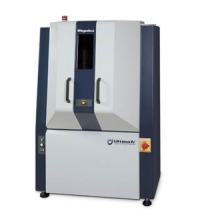 The diffractometer of the Unit is a Rigaku Ultima IV with a 285mm radius goniometer operating in θ/θ mode. The system has a 3kW X-ray generator with a Cu tube. The system is equipped with various sample stages and optics. Cross Beam Optics (CBO) allows the easy change of the beam configuration, from focused to parallel. Additionally a 2 bounce Ge monochromator can be used for high resolution measurements. There are two available detectors one scintillator and a 1D silicon strip detector.
The diffractometer of the Unit is a Rigaku Ultima IV with a 285mm radius goniometer operating in θ/θ mode. The system has a 3kW X-ray generator with a Cu tube. The system is equipped with various sample stages and optics. Cross Beam Optics (CBO) allows the easy change of the beam configuration, from focused to parallel. Additionally a 2 bounce Ge monochromator can be used for high resolution measurements. There are two available detectors one scintillator and a 1D silicon strip detector.
With the eurelean cradle stage users can perform powder diffraction measurements (XRD), Grazing Incidence (GIXRD), pole figures, stress measurements, reciprocal space mapping and X-ray reflectivity XRR (also in HR) among others. An additional XYZ stage is also available for micro XRD measurements.
AFM/SPM
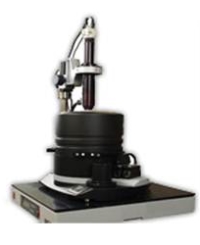 RUNMS is equipped with a multifunction Scanning Probe Microscope/Atomic Force Microscope (NTEGRA Prima, NT-MDT), for scanning and measuring surface properties of materials with nanoscopic resolutions. The unit is equipped with a Hybrid (HD) mode electronic controller for force control and quantification of mechanical properties of soft and hard materials. The following modes of scanning are available: Topography (Contact Mode, Tapping Mode), Lateral Force Microscopy, Spreading Resistance Imaging, Piezoresponse Force Microscopy, Force Modulation, Force Spectroscopy, Nanoindentation, Magnetic Force Microscopy, Kelvin Probe Microscopy, Electric Force Microscopy, NanoLithography. Tests can be performed in the -35°C to 250°C range, in air or liquid.
RUNMS is equipped with a multifunction Scanning Probe Microscope/Atomic Force Microscope (NTEGRA Prima, NT-MDT), for scanning and measuring surface properties of materials with nanoscopic resolutions. The unit is equipped with a Hybrid (HD) mode electronic controller for force control and quantification of mechanical properties of soft and hard materials. The following modes of scanning are available: Topography (Contact Mode, Tapping Mode), Lateral Force Microscopy, Spreading Resistance Imaging, Piezoresponse Force Microscopy, Force Modulation, Force Spectroscopy, Nanoindentation, Magnetic Force Microscopy, Kelvin Probe Microscopy, Electric Force Microscopy, NanoLithography. Tests can be performed in the -35°C to 250°C range, in air or liquid.
Technical Specifications
OPTICAL
uv/vis Spectrometer
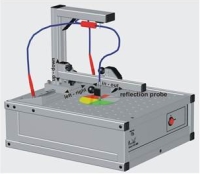 A UV/VIS system (Thetametrisis) designed to cover all measurement needs for Film Characterization (thickness, optical properties). The system has a spectral operation range of 250 – 850 nm achieved by the use of combined Deuterium – Halogen light source, and functions in two modes: Reflectance and Transmittance. The FR-Basic tool is supplied with FR-Monitor software that obtains and manages the data, provides mathematical tools (fitting) and calculates the Absorbance properties of the sample.
A UV/VIS system (Thetametrisis) designed to cover all measurement needs for Film Characterization (thickness, optical properties). The system has a spectral operation range of 250 – 850 nm achieved by the use of combined Deuterium – Halogen light source, and functions in two modes: Reflectance and Transmittance. The FR-Basic tool is supplied with FR-Monitor software that obtains and manages the data, provides mathematical tools (fitting) and calculates the Absorbance properties of the sample.
Technical Specifications
Solar Simulator
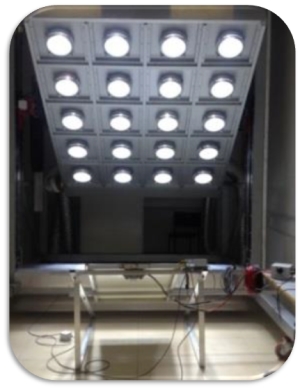 A solar simulator enables the study of solar systems in a controlled environment. A rectangular arrangement of 20 bulbs (575 W each) is used to simulate the solar spectrum with a maximum of 1200 W/m2. The simulator has an adjustable height and inclination (0-90 degrees) and with an independent control over each bulb.
A solar simulator enables the study of solar systems in a controlled environment. A rectangular arrangement of 20 bulbs (575 W each) is used to simulate the solar spectrum with a maximum of 1200 W/m2. The simulator has an adjustable height and inclination (0-90 degrees) and with an independent control over each bulb.
Technical Specifications
MECHANICAL
Nanoindenter
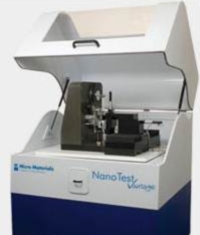 With instrumented indentation the mechanical measurements of materials can be probed down to nanometer scale. In this platform (NanoTest, Micro Materials, Wrexham, UK), a diamond indenter penetrates into the surface of the interested material. Through the applied force of indenter and the resulting penetration depth, the mechanical response of materials can be evaluated
With instrumented indentation the mechanical measurements of materials can be probed down to nanometer scale. In this platform (NanoTest, Micro Materials, Wrexham, UK), a diamond indenter penetrates into the surface of the interested material. Through the applied force of indenter and the resulting penetration depth, the mechanical response of materials can be evaluated
Depending on the configuration (micro or nano indentation), a range of mechanical tests can be performed in air, liquid or high temperature environments (up to 500°C): normal indentation (hardness, elastic modulus, creep), scratch and wear (tribological performance), impact and fatigue (fracture process), fretting.
Technical Specifications
Characterization Lab
This lab is dedicated to the characterization of matter, with emphasis at small scales. The types of characterization include structural, physical, optical, magnetical and mechanical.
MICROSTRUCTURAL
XRR/XRD
 The diffractometer of the Unit is a Rigaku Ultima IV with a 285mm radius goniometer operating in θ/θ mode. The system has a 3kW X-ray generator with a Cu tube. The system is equipped with various sample stages and optics. Cross Beam Optics (CBO) allows the easy change of the beam configuration, from focused to parallel. Additionally a 2 bounce Ge monochromator can be used for high resolution measurements. There are two available detectors one scintillator and a 1D silicon strip detector.
The diffractometer of the Unit is a Rigaku Ultima IV with a 285mm radius goniometer operating in θ/θ mode. The system has a 3kW X-ray generator with a Cu tube. The system is equipped with various sample stages and optics. Cross Beam Optics (CBO) allows the easy change of the beam configuration, from focused to parallel. Additionally a 2 bounce Ge monochromator can be used for high resolution measurements. There are two available detectors one scintillator and a 1D silicon strip detector.
With the eurelean cradle stage users can perform powder diffraction measurements (XRD), Grazing Incidence (GIXRD), pole figures, stress measurements, reciprocal space mapping and X-ray reflectivity XRR (also in HR) among others. An additional XYZ stage is also available for micro XRD measurements.
AFM/SPM
 RUNMS is equipped with a multifunction Scanning Probe Microscope/Atomic Force Microscope (NTEGRA Prima, NT-MDT), for scanning and measuring surface properties of materials with nanoscopic resolutions. The unit is equipped with a Hybrid (HD) mode electronic controller for force control and quantification of mechanical properties of soft and hard materials. The following modes of scanning are available: Topography (Contact Mode, Tapping Mode), Lateral Force Microscopy, Spreading Resistance Imaging, Piezoresponse Force Microscopy, Force Modulation, Force Spectroscopy, Nanoindentation, Magnetic Force Microscopy, Kelvin Probe Microscopy, Electric Force Microscopy, NanoLithography. Tests can be performed in the -35°C to 250°C range, in air or liquid.
RUNMS is equipped with a multifunction Scanning Probe Microscope/Atomic Force Microscope (NTEGRA Prima, NT-MDT), for scanning and measuring surface properties of materials with nanoscopic resolutions. The unit is equipped with a Hybrid (HD) mode electronic controller for force control and quantification of mechanical properties of soft and hard materials. The following modes of scanning are available: Topography (Contact Mode, Tapping Mode), Lateral Force Microscopy, Spreading Resistance Imaging, Piezoresponse Force Microscopy, Force Modulation, Force Spectroscopy, Nanoindentation, Magnetic Force Microscopy, Kelvin Probe Microscopy, Electric Force Microscopy, NanoLithography. Tests can be performed in the -35°C to 250°C range, in air or liquid.
Technical Specifications
OPTICAL
uv/vis Spectrometer
 A UV/VIS system (Thetametrisis) designed to cover all measurement needs for Film Characterization (thickness, optical properties). The system has a spectral operation range of 250 – 850 nm achieved by the use of combined Deuterium – Halogen light source, and functions in two modes: Reflectance and Transmittance. The FR-Basic tool is supplied with FR-Monitor software that obtains and manages the data, provides mathematical tools (fitting) and calculates the Absorbance properties of the sample.
A UV/VIS system (Thetametrisis) designed to cover all measurement needs for Film Characterization (thickness, optical properties). The system has a spectral operation range of 250 – 850 nm achieved by the use of combined Deuterium – Halogen light source, and functions in two modes: Reflectance and Transmittance. The FR-Basic tool is supplied with FR-Monitor software that obtains and manages the data, provides mathematical tools (fitting) and calculates the Absorbance properties of the sample.
Technical Specifications
Solar Simulator
 A solar simulator enables the study of solar systems in a controlled environment. A rectangular arrangement of 20 bulbs (575 W each) is used to simulate the solar spectrum with a maximum of 1200 W/m2. The simulator has an adjustable height and inclination (0-90 degrees) and with an independent control over each bulb.
A solar simulator enables the study of solar systems in a controlled environment. A rectangular arrangement of 20 bulbs (575 W each) is used to simulate the solar spectrum with a maximum of 1200 W/m2. The simulator has an adjustable height and inclination (0-90 degrees) and with an independent control over each bulb.
Technical Specifications
MECHANICAL
Nanoindenter
 With instrumented indentation the mechanical measurements of materials can be probed down to nanometer scale. In this platform (NanoTest, Micro Materials, Wrexham, UK), a diamond indenter penetrates into the surface of the interested material. Through the applied force of indenter and the resulting penetration depth, the mechanical response of materials can be evaluated
With instrumented indentation the mechanical measurements of materials can be probed down to nanometer scale. In this platform (NanoTest, Micro Materials, Wrexham, UK), a diamond indenter penetrates into the surface of the interested material. Through the applied force of indenter and the resulting penetration depth, the mechanical response of materials can be evaluated
Depending on the configuration (micro or nano indentation), a range of mechanical tests can be performed in air, liquid or high temperature environments (up to 500°C): normal indentation (hardness, elastic modulus, creep), scratch and wear (tribological performance), impact and fatigue (fracture process), fretting.
Technical Specifications
 The diffractometer of the Unit is a Rigaku Ultima IV with a 285mm radius goniometer operating in θ/θ mode. The system has a 3kW X-ray generator with a Cu tube. The system is equipped with various sample stages and optics. Cross Beam Optics (CBO) allows the easy change of the beam configuration, from focused to parallel. Additionally a 2 bounce Ge monochromator can be used for high resolution measurements. There are two available detectors one scintillator and a 1D silicon strip detector.
The diffractometer of the Unit is a Rigaku Ultima IV with a 285mm radius goniometer operating in θ/θ mode. The system has a 3kW X-ray generator with a Cu tube. The system is equipped with various sample stages and optics. Cross Beam Optics (CBO) allows the easy change of the beam configuration, from focused to parallel. Additionally a 2 bounce Ge monochromator can be used for high resolution measurements. There are two available detectors one scintillator and a 1D silicon strip detector. RUNMS is equipped with a multifunction Scanning Probe Microscope/Atomic Force Microscope (NTEGRA Prima, NT-MDT), for scanning and measuring surface properties of materials with nanoscopic resolutions. The unit is equipped with a Hybrid (HD) mode electronic controller for force control and quantification of mechanical properties of soft and hard materials. The following modes of scanning are available: Topography (Contact Mode, Tapping Mode), Lateral Force Microscopy, Spreading Resistance Imaging, Piezoresponse Force Microscopy, Force Modulation, Force Spectroscopy, Nanoindentation, Magnetic Force Microscopy, Kelvin Probe Microscopy, Electric Force Microscopy, NanoLithography. Tests can be performed in the -35°C to 250°C range, in air or liquid.
RUNMS is equipped with a multifunction Scanning Probe Microscope/Atomic Force Microscope (NTEGRA Prima, NT-MDT), for scanning and measuring surface properties of materials with nanoscopic resolutions. The unit is equipped with a Hybrid (HD) mode electronic controller for force control and quantification of mechanical properties of soft and hard materials. The following modes of scanning are available: Topography (Contact Mode, Tapping Mode), Lateral Force Microscopy, Spreading Resistance Imaging, Piezoresponse Force Microscopy, Force Modulation, Force Spectroscopy, Nanoindentation, Magnetic Force Microscopy, Kelvin Probe Microscopy, Electric Force Microscopy, NanoLithography. Tests can be performed in the -35°C to 250°C range, in air or liquid. A UV/VIS system (Thetametrisis) designed to cover all measurement needs for Film Characterization (thickness, optical properties). The system has a spectral operation range of 250 – 850 nm achieved by the use of combined Deuterium – Halogen light source, and functions in two modes: Reflectance and Transmittance. The FR-Basic tool is supplied with FR-Monitor software that obtains and manages the data, provides mathematical tools (fitting) and calculates the Absorbance properties of the sample.
A UV/VIS system (Thetametrisis) designed to cover all measurement needs for Film Characterization (thickness, optical properties). The system has a spectral operation range of 250 – 850 nm achieved by the use of combined Deuterium – Halogen light source, and functions in two modes: Reflectance and Transmittance. The FR-Basic tool is supplied with FR-Monitor software that obtains and manages the data, provides mathematical tools (fitting) and calculates the Absorbance properties of the sample. A solar simulator enables the study of solar systems in a controlled environment. A rectangular arrangement of 20 bulbs (575 W each) is used to simulate the solar spectrum with a maximum of 1200 W/m2. The simulator has an adjustable height and inclination (0-90 degrees) and with an independent control over each bulb.
A solar simulator enables the study of solar systems in a controlled environment. A rectangular arrangement of 20 bulbs (575 W each) is used to simulate the solar spectrum with a maximum of 1200 W/m2. The simulator has an adjustable height and inclination (0-90 degrees) and with an independent control over each bulb. With instrumented indentation the mechanical measurements of materials can be probed down to nanometer scale. In this platform (NanoTest, Micro Materials, Wrexham, UK), a diamond indenter penetrates into the surface of the interested material. Through the applied force of indenter and the resulting penetration depth, the mechanical response of materials can be evaluated
With instrumented indentation the mechanical measurements of materials can be probed down to nanometer scale. In this platform (NanoTest, Micro Materials, Wrexham, UK), a diamond indenter penetrates into the surface of the interested material. Through the applied force of indenter and the resulting penetration depth, the mechanical response of materials can be evaluated
